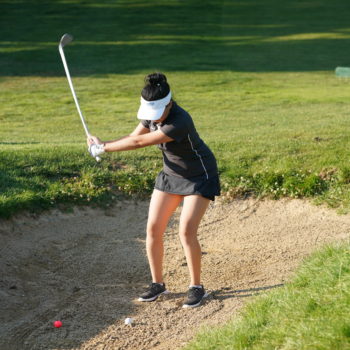
Three Crucial Tips for Controlling Your Emotions
Whenever I give a team talk or presentation, I always ask the athletes and performers how much of their event they feel is mental. The range of answers is usually between 45-90%, regardless of age, gender, or sport/activity. With further prompting, these same athletes will often mention things like getting psyched up, visualizing, and the setting of goals as mental skills there are familiar with. According to Dr. Jack Lesyk, there are nine mental skills every performer and athlete uses prior to, during, and after competing in a practice and competition. In this post, the focus will be on one of those nine mental skills; Emotional Control and why it’s crucial for effective performances. Hierarchically, Emotional Control mainly factors in during a training session or performance, rather than say, before one begins to train or play.

Emotional control in sport is often the difference between winning and losing… Emotions can either fuel your play or ruin your performance. They can help you stay calm, defend with purpose, anticipate opponent attacks, execute a difficult technique with precision, pass cleanly, shoot accurately, or maintain a certain pace, etc. Many negative emotions, if not kept in check, will crush your competitive spirit and impair your ability to perform at your peak. Low Negative emotions, such as frustration and disappointment, can linger long after you first experience them and can last from several minutes, to the remainder of a competition. Often these lack of emotional control examples may crop up after a mistake of some kind or from variety of other sources like missed opportunities, mental errors, bad calls, pressure from coaches/yourself/teammates or just a subpar performance.

Emotions affect a player physically and mentally. And whether you would like to admit it or not, we all have them. Imagine being very sad and trying to jump your highest at the same time. Not likely to be a very good jump. Low Negative emotions will rob you of strength, focus, drive, and concentration. Now imagine you are really angry and want to jump for height. High Negative emotions increase muscle tension, accelerate breathing, cause a loss of coordination and, deplete your energy. So, you might end up going pretty high, but if this were a basketball game, and you were trying to complete a layup while jumping, you might end up laying the ball off the glass too hard. Negative emotions, whether low or high, can cause serious mental consequences such as; reduced confidence, fragmented focus, and decreased motivation.
Here’s a common experience shared by many athletes in regard to negative emotions…
“I know that I shouldn’t allow one mistake ruin the rest of my performance. I get that. I try to focus on the next play but after I make a mistake, sometimes I feel lots of anger and frustration about that mistake and it sticks around and gets to me for a while.”
Yes, intense emotional feelings can cause your performance to unravel. Playing well requires that you handle the internal battle within your mind. How can you minimize to the effects of negative emotions?
Realize that it is not the mistake that starts the downward spiral; it is your thoughts about the mistake that create the overwhelming negative feelings.
Focusing on your thoughts about the mistake compounds the effect and intensifies the emotion.
The reason some athletes find it difficult to release negative emotions is that they dwell on the mistake long after that play has finished. Author Richard Carlson stated, “A mind that is ‘out of the present’ is fertile ground for worry, anxiety and regret.”
The most effective strategy for minimizing the effects of negative emotions is to re-focus on what you need to do right now. Quickly move past the mistake or concerning moment by asking yourself “What’s Important Now?”. This technique is the best way to get your brain back on the moment at hand and dial in to the task at hand. When you are back to thinking in the present, you will find you can then focus your efforts on the controllable variables within skills that you have performed thousands of times.
Since thoughts create emotion, you can change your emotion by changing your reaction to a mistake or mishap. In sport, mistakes and change are always going to be present. How we choose to respond to a mistake or challenging situation is crucial.
What can you do in these moments to turn the tide in your favor?
You are only one thought away from an optimal competitive mindset, but you must be proactive in creating those thoughts. In other words, effective athletes pre-plan their responses to challenging situations so that they have practiced how they will handle things before they come up. This is called mental rehearsal.

THREE TIPS TO MAINTAINING EMOTIONAL BALANCE FOR ATHLETES:
#1: Anticipate what situations may cause intense emotional reactions (bad calls, careless errors, mistakes at crucial points in the game, etc.).
Decide ahead of time how you will react to each situation. Will you be motivated by the challenge of overcoming adversity or will you allow the mistake to snowball and ruin your performance? A pre-planned response means you are able quickly move on to the next thing by following the plan you have already rehearsed for these difficult moments.
#2: Create a new reaction (“No problem, I’ve planned for this” or “Cowboy up and handle the challenge”). Remind yourself that being proactive during times of crisis produces forward motion with a higher chance of a positive next play/decision.

#3: As we often talk about, projecting positive body language is another great way to manage your emotions. Projecting positive body language after a mistake shows the world that they were lucky this time, but next time things are going Your way! Positive body language increases your confidence and energy and helps you effectively get back to playing well.
- Getting Your Intensity Level Right - March 17, 2025
- Building a Functional Resilience Plan is Vital to a Referee’s Success - February 18, 2025
- sport in a pandemic: Crisis or opportunity?Chapter 4 - December 4, 2020


